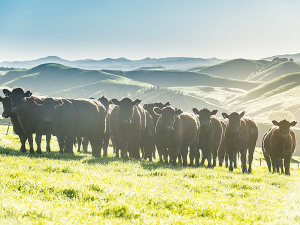NZ Catchment Groups Thrive with ‘Source to Sea’ Approach
The most successful catchment groups in NZ are those that have 'a source to sea' approach.
 The programme will lower the beef sector's greenhouse gas emissions by delivering gas emissions by delivering cows with a smaller environmental hoof-print.
The programme will lower the beef sector's greenhouse gas emissions by delivering gas emissions by delivering cows with a smaller environmental hoof-print.
Dairy farmers are set to benefit from a $17 million beef genetics programme backed by the red meat sector and the Government.
Beef+Lamb New Zealand (B+LNZ) is providing $10m towards the seven-year project Informing New Zealand Beef, the Ministry for Primary Industries will provide the balance.
The project is expected to result in more efficient cows within the next 25 years. The programme is targeting a 10% reduction in greenhouse gas emissions per kilogram of product produced.
Agriculture Minister Damien O'Connor says the programme will lower the beef sector's greenhouse gas emissions by delivering cows with a smaller environmental hoof-print.
"The cows most suited to New Zealand's production systems will be moderate in size, but still highly productive. Moderate sized cows which require less feed will help to lower the impact on soils and produce less methane," says O'Connor.
"To date we've relied on an Australian beef genetics framework, but the time is right to create our own programme tailored to New Zealand conditions."
B+LNZ chief executive Sam McIvor says the programme capitalises on New Zealand's world-leading skills and knowledge in sheep genetics and applies them to the beef industry.
"The data tells us that our beef industry has been lagging behind on genetic progress," he says.
"Not only will this give the industry better genetic tools, but a major focus of the programme is to work with commercial farmers to increase understanding and grow confidence in using genetic information to drive productivity and profitability."
McIvor says dairy farmers also stand to benefit significantly.
"With these new production-focused genetic selection tools, dairy farmers will be able to select semen from beef bulls for artificial insemination in their herds, more confident that they will have shorter gestation, easy calving and produce more valuable calves."
The Meat Industry Association of New Zealand (MIA) today announced that Chief Executive Officer Sirma Karapeeva has resigned from the role.
The winners of the 2026 Hawke’s Bay/Wairarapa Dairy Industry Awards were announced at the annual awards dinner held at Copthorne Solway Park in Masterton on Thursday evening.
Environment Southland is welcoming this week’s decision by the Environmental Protection Authority (EPA) to approve the release of Blaptea elguetai, a leaf‑feeding beetle that will help control the highly invasive Chilean flame creeper.
This March, the potato industry is proudly celebrating International Women’s Day on 8 March alongside the International Year of the Woman Farmer, recognising the vital role women play across every part of the sector — from paddocks and packhouses to research, leadership, and innovation.
Fruit trader Seeka posted a record profit and returns to shareholders in 2025.
Recent weather events in the Bay of Plenty, Gisborne/Tairawhiti, and Canterbury have been declared a medium-scale adverse event.
OPINION: Staying with politics, with less than nine months to go before the general elections, there’s confusion in the Labour…
OPINION: Winston Peters' tirade against the free trade deal stitched with India may not be all political posturing by the…